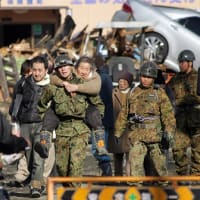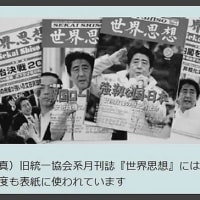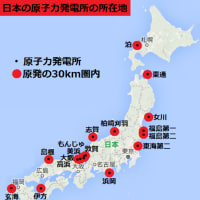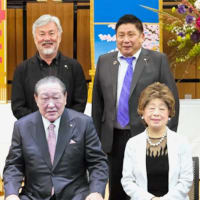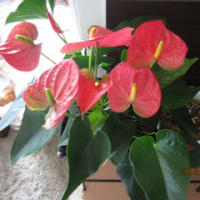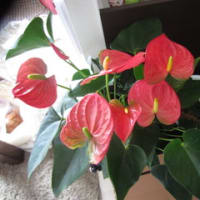Science's COVID-19 reporting is supported by the Pulitzer Center and the Heising-Simons Foundation

COVID-19 hopes are riding on antibodies that bind to a key surface protein of the new coronavirus (orange in an artist's concept).
IMAGE: JUAN GAERTNER/SCIENCE SOURCE
世界はCOVID-19ワクチンを開発するためのハイステークスレースによって解決されていますが、同様に重要な競争は、ウイルスに対する即時の免疫ブーストを提供できる標的抗体を生産するために激化しています。疾患の予防と治療の両方が可能なこれらのモノクローナル抗体の臨床試験はすでに進行中であり、おそらくワクチン試験に先立って、今後数ヶ月で有効性の兆候を生み出す可能性があります。 「あなたがあなたのお金を下に置くつもりなら、あなたがワクチンで答えを得る前にあなたがモノクローナルで答えを得ることに賭けるでしょう」と国立アレルギー感染症研究所(NIAID)の責任者であるAnthony Fauciは言います。
“Antibodies have the potential to be an important bridge until the vaccine is available,” says Ajay Nirula, a vice president at Eli Lilly, one of several large companies investing in them. Likely to be more effective than remdesivir and dexamethasone, the repurposed drugs shown to help against COVID-19, antibodies could protect the highest risk health care workers from becoming infected while also lessening the severity of the disease in hospitalized patients. But producing monoclonals typically involves using bioreactors to grow hamster or mouse cells engineered to carry genes that make the proteins. On 15 July, Lilly, AbCellera, AstraZeneca, GlaxoSmithKline, Genentech, and Amgen jointly asked the U.S. Department of Justice (DOJ) whether they could share information about manufacturing their monoclonals without violating antitrust laws “to expand and expedite production.”
「抗体はワクチンが利用可能になるまで重要な橋になる可能性があります」と投資しているいくつかの大企業の1つであるEli Lillyの副社長であるAjay Nirulaは言います。レビデシビルやデキサメタゾンより効果的である可能性が高く、COVID-19に役立つことが示されている転用薬である抗体は、入院患者の病気の重症度を軽減すると同時に、リスクが最も高い医療従事者の感染を防ぐことができます。しかし、モノクローナル抗体の生産には、通常、バイオリアクターを使用して、タンパク質を作る遺伝子を運ぶように設計されたハムスターまたはマウスの細胞を成長させる必要があります。 7月15日、リリー、AbCellera、AstraZeneca、GlaxoSmithKline、Genentech、Amgenは、合衆国司法省(DOJ)に、独占禁止法に違反せずにモノクローナル抗体の製造に関する情報を共有して「生産を拡大し促進する」ことができるかどうかを共同で尋ねた。
Soon after the pandemic began, researchers in industry and academia began to identify, design, tweak, and conduct lab tests of monoclonal antibodies against SARS-CoV-2, the virus that causes COVID-19. Most bind to and “neutralize” the viral surface protein, or spike, that initiates an infection. On 29 May, Lilly, working with AbCellera, launched the first human study of a monoclonal antibody—a phase I trial testing its safety and tolerability in hospitalized COVID-19 patients. Other safety trials followed, from Lilly's Chinese partner Junshi Biosciences and Regeneron, which developed a cocktail of three monoclonals that works against Ebola.
パンデミックが始まって間もなく、産業界や学界の研究者たちは、COVID-19を引き起こすウイルスであるSARS-CoV-2に対するモノクローナル抗体の同定、設計、微調整、および実験室試験を開始しました。ほとんどは、感染を開始するウイルス表面タンパク質またはスパイクに結合して「中和」します。 5月29日、リリーはAbCelleraと協力して、モノクローナル抗体の最初のヒト試験を開始しました。これは、入院中のCOVID-19患者における安全性と忍容性をテストする第I相試験です。その後、リリーの中国のパートナーであるJunshi BiosciencesとRegeneronによる他の安全性試験が行われ、エボラに対して有効な3つのモノクローナルのカクテルが開発されました。
Regeneron is now testing the efficacy of its COVID-19 cocktail, which combines a spike antibody from a person who recovered and one from a mouse given the spike protein, in three large-scale, placebo-controlled trials. A prevention trial run in coordination with NIAID's COVID-19 Prevention Trials Network (CoVPN), an arm of the Trump administration's Operation Warp Speed, will recruit 2000 people who live in a house with a confirmed COVID-19 case. One treatment study run by the company aims to enroll nearly 2600 hospitalized people with severe COVID-19, whereas another, about half that size, will test the antibodies in infected people with mild or moderate symptoms. Lilly has launched its own trials, including a phase III, placebo-controlled study in 2400 residents or staff of long-term care facilities, run with the help of CoVPN.
Regeneronは現在、3人の大規模なプラセボ対照試験で、COVID-19カクテルの効果をテストしています。トランプ政権の作戦ワープスピードの一部であるNIAIDのCOVID-19予防トライアルネットワーク(CoVPN)と連携して実行される予防トライアルでは、COVID-19のケースが確認された家に住む2000人を募集します。同社が実施した治療研究の1つは、重症のCOVID-19の約2600人の入院患者を登録することを目的としています。リリーは、CoVPNの助けを借りて実施された2400人の居住者または介護施設のスタッフを対象としたフェーズIIIプラセボ対照試験を含む独自の試験を開始しました。
“We should be able to see an efficacy signal very quickly” from these trials, says Amy Jenkins, who heads the Pandemic Prevention Platform (P3) program at the Defense Advanced Research Projects Agency, which for 2 years has invested in speeding the development of monoclonal antibodies. Although Jenkins hesitates to make a firm prediction, she says the November-December time frame is “realistic and conservative.” That is likely earlier than any vaccine will prove safe and effective, researchers predict. “I would be reluctant to say [that] would be any earlier than the end of the year,” Fauci said at a press conference about the launch of NIAID's first COVID-19 efficacy vaccine trial on 27 July.
これらの試験から「私たちは非常に迅速に有効性の信号を見ることができるはずです」と、国防高等研究計画局のパンデミック予防プラットフォーム(P3)プログラムを率いるエイミー・ジェンキンスは言います。モノクローナル抗体。ジェンキンス氏は確固たる予測をすることをためらっていますが、11月から12月までの期間は「現実的で保守的」であると彼女は言います。これは、どのワクチンも安全で効果的であることを証明するよりも早いと思われます。 7月27日のNIAIDによる最初のCOVID-19有効性ワクチン試験の開始についての記者会見で、フォーチは記者会見で「年末より早いとは言いたくない」と述べた。
Regeneron's Christos Kyratsous notes that vaccine trials must wait a few weeks for a person's immune system to develop appropriate responses to shots and further weeks for “the event”—a chance exposure to SARS-CoV-2. This means those trials require time and many people. In contrast, for the antibody treatment trials, “your event has already happened,” Kyratsous says. And in the prevention studies, the household contacts of COVID-19 cases will be much more likely to be exposed than people who typically join a vaccine efficacy study.
RegeneronのChristos Kyratsous氏は、ワクチンの試験は、人の免疫系がショットに適切に反応するまで数週間、さらに「イベント」(SARS-CoV-2への偶然の暴露)まで数週間待つ必要があると述べています。つまり、これらの試験には時間と多くの人が必要です。対照的に、抗体治療試験では、「あなたの出来事はすでに起こっています」とキーラトゥースは言います。また、予防研究では、COVID-19ケースの家庭の接触者は、ワクチンの有効性研究に通常参加する人々よりも暴露される可能性がはるかに高くなります。
Immunologist Dennis Burton, whose group at Scripps Research has isolated highly potent monoclonal antibodies against SARS-CoV-2 that it hopes to move into human studies (Science, 15 June, DOI: 10.1126/science.abc8511), says he is optimistic that monoclonals will protect people from infection for months with a single shot. “It's much easier to take care of a few incoming virus particles than to try and resolve or cure an ongoing infection.” The same logic holds for treatment. “Hit the virus hard and early,” Burton says.
Scripps Researchのグループである免疫学者Dennis Burtonは、SARS-CoV-2に対する非常に強力なモノクローナル抗体を分離し、ヒトの研究に移行することを望んでいます(Science、6月15日、DOI:10.1126 / science.abc8511)。シングルショットで数ヶ月間人々を感染から守ります。 「進行中の感染を解決して解決するよりも、いくつかの着信ウイルス粒子を処理する方がはるかに簡単です。」同じ論理が治療にも当てはまります。 「ウイルスを激しく早期に攻撃します」とバートン氏は言います。
Kyratsous says even if monoclonal antibodies don't beat vaccines to the finish line, they still might have a role to play against COVID-19. “We're going to need both approaches in the long run,” Kyratsous suggests. Vaccines are rarely 100% effective, and many people may decline a vaccine or skip immunization for other reasons. What's more, he notes, the elderly or people who are immune compromised may not mount robust immune responses after being vaccinated.
Kyratsous氏は、たとえモノクローナル抗体が最終段階までワクチンを打ち負かしていなくても、COVID-19と対抗する役割を果たす可能性があると言います。 「長期的には、両方のアプローチが必要になるでしょう」とKyratsousは示唆しています。ワクチンが100%効果的であることはめったになく、他の理由で多くの人がワクチンを断るか、予防接種をスキップすることがあります。さらに、高齢者や免疫力が低下している人々は、ワクチン接種を受けた後も強力な免疫反応を開始しない可能性があると彼は指摘します。
Supplies of monoclonal antibodies may be limited, however, in part because of modest investment. Operation Warp Speed, for example, has committed $8 billion to six different COVID-19 vaccines; for monoclonals, the government has invested about $750 million, much of it in Regeneron, which will produce somewhere between 70,000 and 300,000 doses before it even has efficacy data. Lilly says it will have 100,000 doses by the end of the year.
モノクローナル抗体の供給は限られているかもしれませんが、投資が控えめなためです。たとえば、ワープスピードオペレーションでは、6種類のCOVID-19ワクチンに80億ドルを投入しています。モノクローナル抗体の場合、政府は約7億5,000万ドルを投資しており、その多くはRegeneronに費やされています。リリーは、それが年末までに100,000回の服用になると言います。
But no one knows how far those doses would stretch, says Janet Woodcock, who is on leave from the Food and Drug Administration to lead Warp Speed's therapeutic effort. If the antibodies work, a study from the Duke University Margolis Center for Health Policy estimates the United States alone could require nearly 40 million doses next year for prevention and treatment. “Unlike with vaccines, it is hard to project the number of treatment courses that will be available,” Woodcock says. Prevention, which would be a single intramuscular shot, requires less product than the intravenous infusions used in treatment, she notes, but the amount needed depends on a person's weight.
しかし、これらの投与量がどれだけ伸びるかは誰にもわからない、とJaret Woodcockは言う。WarpSpeedの治療努力を主導するために食品医薬品局から休暇を取っている。抗体が機能する場合、デューク大学マーゴリス保健政策センターの研究では、米国だけで予防と治療のために来年には約4,000万回の投与が必要になると予測しています。 「ワクチンとは異なり、利用可能な治療コースの数を予測することは困難です」とウッドコックは言います。予防は1回の筋肉内注射であり、治療に使用される点滴よりも少ない製品で済みますが、必要な量は人の体重によって異なります
Although how to prioritize vaccine distribution has already sparked extensive debate, no such discussion has yet taken place about monoclonal antibodies. But DOJ acknowledged the supply concerns on 23 July, giving the six companies that had petitioned it the green light to share production information.
ワクチンの配布をどのように優先させるかについては、すでに多くの議論が巻き起こっていますが、モノクローナル抗体についてはそのような議論はまだ行われていません。しかし、DOJは7月23日に供給の懸念を認め、これに請願していた6社が生産情報を共有することを許可しました。
Regeneron is not part of that group, yet Kyratsous is optimistic about meeting the need. “The good thing with some of these biologics is you can ramp up production fairly fast,” he says. Nirula agrees. “If we have success in these clinical trials, we will have a lot of drug available,” he says.
Regeneronはそのグループの一部ではありませんが、Kyratsousはニーズを満たすことに楽観的です。 「これらの生物製剤のいくつかの良い点は、生産をかなり速く増やすことができることです」と彼は言います。ニルラも同意する。 「これらの臨床試験で成功すれば、多くの医薬品が手に入るでしょう」と彼は言う。
The cost of monoclonals, especially for the higher doses needed for treatment, could split the world into the haves and have-nots. “It's unlikely that that treatment will get down to a price point in the near future that it would be easily affordable globally,” says Seth Berkley, who leads Gavi, the Vaccine Alliance, and heads an international COVID-19 vaccine effort.
モノクローナル抗体のコストは、特に治療に必要な高用量の場合、世界を有罪と無罪に分けることができます。 「その治療法が近い将来に世界的に容易に手頃な価格になることになるとは考えられません」とワクチンアライアンスのGaviを率いて国際的なCOVID-19ワクチンの取り組みを率いるSeth Berkleyは言います。
Jenkins says a key aim of the P3 project, which has provided four groups with $96 million in seed money, has been to develop monoclonal antibodies that can be made by the body itself, instead of in large fermentation tanks. The idea, which has not yet been tested in humans for COVID-19, is to inject people with DNA or messenger RNA that encodes a desired antibody, allowing their own cells to make it. “We think we can bring down the cost of monoclonal antibodies,” Jenkins says.
ジェンキンス氏は、4つのグループに9600万ドルのシードマネーを提供したP3プロジェクトの主な目的は、大規模な発酵タンクではなく、体自体で作成できるモノクローナル抗体を開発することであると言います。人間でCOVID-19についてまだテストされていないアイデアは、希望の抗体をコードするDNAまたはメッセンジャーRNAを人々に注入して、自分の細胞がそれを作ることを可能にすることです。 「モノクローナル抗体のコストを下げることができると私たちは考えています」とJenkins氏は言います。
Regardless of cost, evidence that monoclonals work as preventives could benefit everyone by giving vaccinemakers a clear sign that antibodies against the surface protein of SARS-CoV-2 are enough to protect a person. This, in turn, could provide a strong indicator for evaluating the worth of a candidate vaccine short of actual efficacy data. “It will be earthshaking to the vaccine field in a positive way,” says Myron Cohen of the University of North Carolina, Chapel Hill, who leads testing of monoclonal antibodies for CoVPN. “It provides a thousand opportunities to move forward faster.”
費用に関係なく、モノクローナル抗体が予防薬として機能するという証拠は、SARS-CoV-2の表面タンパク質に対する抗体が人を保護するのに十分であることをワクチンメーカーに明確に示すことで、すべての人に利益をもたらす可能性があります。これは、順番に、実際の有効性データに不足している候補ワクチンの価値を評価するための強力な指標を提供する可能性があります。 「これは、ワクチン分野に前向きな影響を与えるでしょう」と、CoVPNのモノクローナル抗体のテストを率いるノースカロライナ大学チャペルヒルのMyron Cohenは言います。 「それはより早く前進するための千の機会を提供します。」
要約を表示するワクチンの配布を優先する方法はすでに広範な議論を巻き起こしましたが、モノクローナル抗体についてはそのような議論はまだ行われていません。しかし、DOJは7月23日に供給の懸念を認め、これに請願していた6社が生産情報を共有することを許可しました












